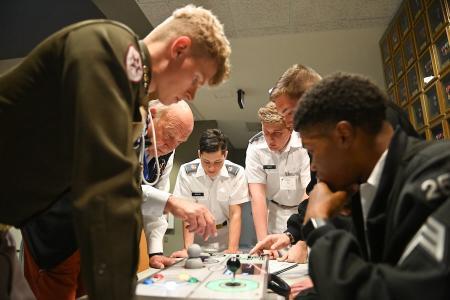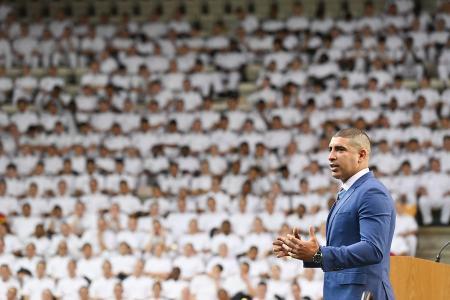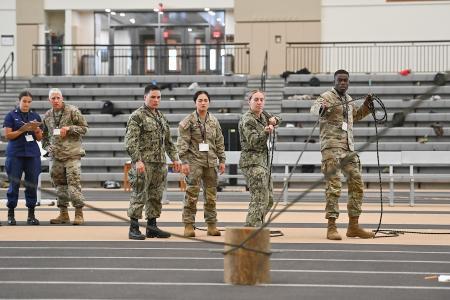Annual Leadership & Ethics Conference Held at VMI

A team works together to progress through the game challenges of SynergyK, during the conference in Marshall Hall. –VMI Photo by H. Lockwood McLaughlin.

LEXINGTON, Va. Nov. 1, 2024 — Virginia Military Institute’s 15th annual Leadership and Ethics Conference hosted by the Center for Leadership and Ethics (CLE) was held Oct. 28-29 in multiple venues throughout post. This year’s theme was “Leading into the Future,” an extension of the CLE’s academic year theme of “Paradigm Shifts,” and focused on diverse themes of leadership and ethics in modern society, and preparing future college graduates to lead through rapidly changing environments.
The conference opened in Marshall Hall with pageantry as the VMI color guard marched in carrying the flags as the Herald Trumpets played “The Star-Spangled Banner” in four-part harmony. Col. Dave Gray, executive director of the CLE, greeted the assembly and charged them to “think creatively and critically, and engage with each other through civil discourse during the highly interactive conference.”
Nearly 180 participants made up of students and staff members from many colleges, universities, and military academies from across the nation including, Christopher Newport University, East Tennessee State University, Hampden-Sydney College, Norwich University, Texas A&M University, The Citadel, U.S. Air Force Academy, U.S. Coast Guard Academy, U.S. Military Academy at West Point, U.S. Naval Academy, Virginia Tech, Washington College, as well as many VMI cadets, gathered to hear inspirational speakers, participate in collaborative activities, and to network. Central to the conference’s programming were small group discussions, interactive activities, and speakers focusing on leading across generations, adaptability, vision in guiding organizations through technological advancements, and fostering personal and team resilience.
During his welcoming remarks, Maj. Gen. Cedric T. Wins ’85, VMI superintendent, shared that each generation faces new challenges.
“I was born between the Baby Boomer generation and Generation X. Most of you are part of the Millennial generation, and each of you are being called upon to play increasing roles as leaders. That’s what we’re here today to talk about, that paradigm shift into the role of assuming leadership in whatever path your journeys take. How you respond will be a direct reflection of how you are prepared. VMI is one of the premier leadership institutions in the nation, and has been at the forefront of training top leaders in military and industry. Our mission is forging 21st century leaders for our nation. Our cadets are taught how to lead, and have the opportunity to practice it every day through peer leadership, arguably some of the toughest leadership experiences that any young man or woman has to undergo.”
Wins evoked VMI’s most famous graduate, Gen. George C. Marshall Jr., VMI Class of 1901 who said, “We cannot train without planning and we cannot teach without preparation,” and imparted to the audience, “We would all be wise to heed this point and begin to anticipate challenges in our various leadership roles.”
The first speaker of the conference was Raven Solomon, CSP®, author of, “Leading Your Parents: 25 Rules to Effective Multigenerational Leadership for Millennials and GenZ.” During her lighthearted, often humorous interactive talk, Solomon spoke about cross generational leadership, and the differences of the living generations which include: the Greatest Generation, born before 1928; the Traditionalists, born between 1928 and 1945; the Baby Boomers, born between 1946 and 1964; GenX born between 1965 and 1980; Millennials born between 1981 and 1996; and GenZ, born between 1997 to 2012, which comprised of 80% of her audience. 
She disclosed that in the current work force, there are five generations working together, more than there have ever been in the past. Solomon acknowledged that generational differences may cause tension, frustration, and contention, but emphasized that each generation possesses strengths, capabilities and skills which should be embraced and used to the betterment of the organization, and better decisions are made when multiple generations provide input. She pointed out that each generation is motivated and inspired differently because of the current events going on in the world during their formative years, their culture, as well as familial dynamic and history. She taught the group useful techniques to implement in earning the trust and respect of each generation that fall under their leadership, and insights to what motivates them.
That afternoon, former VMI head soccer coach, Ben Freakley, Ed.D., CMPC, founder of Ready. Set. Resilient., and his colleague, Tyler McDaniel, Ph.D., an Air Force psychologist, led a presentation in the Corps Physical Training Facility, testing multiple leadership values against hands-on challenges. Freakley opened by stating that effective leaders must possess both intrapersonal and interpersonal skills. The first intrapersonal skill he shared is, “Know Your Enemy of Attention,” which is anything that steals your attention, including social media, multi-tasking, negative recurring thought patterns, and social comparison. The second skill is, “Know Your Personal Values,” which he described as the lighthouse in the storm, a guide in troubled times. The third intrapersonal skill is, “Committed Action.” “There are times in life when we get stuck and can’t reach our goals, but we must remain committed, and set and reach short-term goals until we get unstuck,” Freakley said.
The first interpersonal skill is, “Empathy.” “The more empathy people are given, the more trust they will return, the more engaged they will be, and will offer more innovation, and enjoy better morale,” Freakley shared. The second interpersonal skill is, “Curiosity.” “Learning is the only sustainable competitive advantage. Ask really good open-ended questions in order to learn about people and what they are experiencing,” he advised. The group was then divided into eight teams and guided through a Leadership Reaction Course (LRC), a problem solving, physically demanding obstacle course requiring critical thinking, leadership skills, and teamwork. After completing the LRC, participants shared what they learned about themselves and their teams.
The second day opened with Michelle Ray, the Caroline Dawn Wortham ’12 Leadership Speaker. Ray speaks globally on topics of leadership, accountability, change, and workforce trends, and is author of, “Leading in Real Time.” Ray’s highly interactive presentation was a mix of conversation and energetic activities with her audience, whom she challenged to be ready to lead. “Great organizations have great people, and great people need great leaders. People want to know they matter. Never forget the human side of leading people, because when we take an interest in other people, they take an interest in us. So, your conversations need to be focused on your people, and when your people are aligned with your vision, it’s a beautiful thing,” she said. Ray went on to discuss change, and acknowledged there are three reasons people fear change: It creates discomfort, preference with the status quo, and fear of loss. She quickly followed with eight ways to effectively lead in the midst of change:
- Recognize change as an emotional experience.
- Address the receiver’s fears.
- Tell the recipient how change will benefit them.
- Show them at least one benefit of the change.
- Ask for input.
- Tell the recipient how the change will benefit the organization.
- Involve the recipients in the change process.
- Celebrate the victory. She concluded her presentation with inspiration, “Your resolve will be tested, and when it happens, you need to dig deep within yourself, and look to your role models for encouragement.”
A highlight of the interactive activities at the conference was a game called SynergyK, developed by Play with a Purpose, which uses software to measures a team’s communication, adaptability and unity of purpose. The game incorporates tabletop boxes with four different control stations, encouraging cooperation, and forcing team members to rely on each other to progress through different minigames, which combine puzzle-solving, coordination, and other skills. At the conclusion, a representative from Play with a Purpose led the attendees through a debrief that gave a breakdown of how the software analyzed and tracked team performance. The game was a hands-on example of how artificial intelligence crafts high performing teams made up of members with different skill sets, illustrating one of the conference themes of technology changing the work environment.
The keynote and concluding speaker of the conference was the H.B. Johnson Jr., Class of 1926 Distinguished Speaker, retired U.S. Army Capt. Florent “Flo” Groberg, who spoke in Cameron Hall to the entire Corps of Cadets, guests of the conference, and members of the community. Born in France, Groberg became a U.S. citizen in 2001 at age 18. He graduated from the University of Maryland (UMD) with a degree in criminology and joined the Army in 2008, and served two tours in Afghanistan’s Kunar Province. On Aug. 8, 2012, while leading a security detail, Groberg identified and tackled a suicide bomber, pushing him away from the formation. For his extraordinary heroism and selflessness, Groberg was awarded the Medal of Honor, the highest military decoration, becoming the 10th living recipient for actions in Afghanistan.
Groberg opened his talk with a dramatic, heart wrenching story about his uncle that established the foundation for him to enter the military.
“My uncle was a member of Special Forces in Algeria, and was killed in 1996 by a terrorist organization called the GIA. It was during a Ramadan ceasefire, but he was ambushed, shot, beheaded, dismembered, put in a box, and his remains were sent to my grandfather. What the terrorists did not realize was that at 13 years old, my life changed. My youth was stolen from me. Even though I was 1,000 miles away, for the first time in my life, I was exposed to evil. Fast forward a few years later, I become a nationalized U.S. citizen in 2001 and later that year, terrorists attacked my new adopted country on 9/11. I knew at that point that my path was cemented. I was going to join the military and fight for this country.”
After graduating from UMD, Groberg entered the Army, and soon found himself leading a squad in Afghanistan as a young lieutenant. “I was scared, but I set my ego and pride aside. Those things don’t belong in battle. I admitted to my men that they all had more combat experience than I did, and I was here to learn from them, but I would be responsible for the decisions. We were a team. I trusted my guys to be professional, and I earned their respect.”
During his second deployment, Groberg, 20 of his men, and some Army officials they were escorting were in an Afghan town walking on a one-way road when a suicide bomber approached them. 
“I couldn’t see a weapon, so I couldn’t actually engage with my rifle. I didn’t want to shoot a civilian, but when I looked in his eyes, I knew he was bad. I ran toward him, struck my rifle across his chest, and felt the bomb vest. I let go of my rifle, grabbed him by the vest and yelled, ‘Bomb, bomb, bomb!’ I had to get him away from everybody as quickly as possible, as far as possible, so I threw him, and he detonated. I woke up a couple minutes later, 30 feet away. My foot was facing me, my fibula was gone, blood was everywhere, my head was spinning.” Groberg survived, but sadly, four men were killed that day.
Groberg spent the next four and a half months at Walter Reed National Military Medical Center in Bethesda, Maryland, where he had 34 surgeries. During his time in the hospital Groberg became suicidal, blaming himself for the deaths of those four men, and believing he should have died instead. Travis Mills, a quadruple amputee also wounded in Afghanistan, visited Groberg in the hospital.
“Within 15 minutes of his visit, he had me rewired. He gave me back my purpose, as well as an opportunity to help others. Mills is now a close friend.”
Groberg concluded his talk by answering a question he is frequently asked, why he tackled the suicide bomber.
“It’s love of brotherhood and sisterhood. It’s the mindset of being willing to die for people who are white, black, Asian, Latino, gay, straight, for people who come from France or Zimbabwe, Mexico, California, Belfast, or Maine, for people with GEDs, college degrees, master’s degrees, people who are rich or poor, people who have different religious beliefs or political affiliations. This is what makes this country different. This is what makes this country special, because of all the professions we have, we choose to wear that uniform and we choose to go fight.
Around my wrist, I wear a bracelet bearing the names of the four men who died that day, and each morning when I wake up, I look at this bracelet to set the expectations for the day. I’ve got to set a good example, not just for my son, but also for the families of those men.” Then speaking directly to the cadets he added, “I sleep soundly at night, because of people like you who will be leading our military and protecting this great country of ours. Thank you.”
Next year’s Leadership Conference will be held Oct. 27-28, 2025, with an announcement of the theme and title coming in the spring. To stay informed, visit the conference website and join the mailing list at conferences.vmi.edu/leadership.
Marianne Hause
Communications & Marketing
VIRGINIA MILITARY INSTITUTE
.svg)
.png)